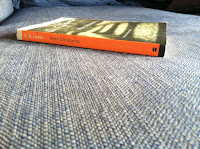Y'all. It's October (what?!) and I still haven't recapped books I finished in August (oy). And the book I'm recapping today, I just finished last Thursday. So obviously my priorities are completely whack and this whole blog is going to pot. Whatever. There's a pumpkin spice candle burning, and I've discovered the goodness of Cherry Vanilla Pepsi. We'll survive.
The Difficult Doctrine of the Love of God by D.A. Carson was first published at the end of 1999 and provides a compelling perspective on the nature of God and His complex love for the world.
I know what you're thinking: What does the "D.A." in D.A. Carson stand for? I can't be the only one who has an irrational need to know what initials stand for. I'll answer: Donald Arthur. Bless him.
Now that we've gotten that out of the way, let's talk about this slim power-packed volume before everything I just learned falls back out of my head.
To start, let me give you a piece of the publisher's blurb about this book:
"The only aspect of God's character the world still believes in is His love. His holiness, His sovereignty, His wrath are often rejected as being incompatible with a 'loving' God. Because pop culture has so distorted and secularized God's love, even many Christians have lost a biblical understanding of it. The Difficult Doctrine of the Love of God seeks to restore what we have lost."
This 93 page treatise (84 pages if you don't count the endnotes and indexes) on the love of God was originally a series of four lectures that Carson has given a number of times at various colleges and churches around the world. I thought it would be a quick Saturday read, but it ended up taking me a week to get through. And just like the book took longer to read than I anticipated, so this blog post will probably be longer than you'd expect for such a short work of non-fiction. Stay with me. We'll take it chapter by chapter.
In the first chapter "On Distorting the Love of God", Carson outlines why the doctrine of the love of God must be judged difficult in the first place, five different ways the Bible speaks of the love of God, and some preliminary observations on the distinctive ways of talking about the love of God. I personally found the first chapter to be the most interesting and helpful section of the whole book. As Carson explained five of the different ways God loves and how absolutizing and defining God's love in only one way is detrimental to a right view of Him, I found myself appreciating how vital it is to abide by the whole counsel of God and realizing anew that the only way to even begin to understand any attribute or aspect of God is to take it in context with every other attribute He has. Just reading this chapter alone would be worth your time.
The second chapter, "God is Love", goes over how
not to proceed vs. how
to proceed with the topic at hand, namely: context is key. We can't just pick one verse out of the Bible,
John 3:16 for example, and get a complete picture of God's love from that one sketch. We have to view God's love in light of His justice and sovereignty and His many other attributes. This chapter was the most difficult for me as Carson delved more deeply into the intra-Trinitarian love of God. I felt that I was swimming a bit out of my depth with a lot of this chapter, but that's to be expected anytime you start to study the nature of the Trinity. God is so infinitely high above us that
some most things about Him will remain a mystery that we will never understand. If we could comprehend Him fully, He would not be God.
In the third chapter, "God's Love and God's Sovereignty", Carson expounds more on God's love for humanity and argues the point of whether God's love is emotional or impassible. The answer, as you might imagine, is complex, but I found this chapter to be extremely interesting and educational. I ought to note that throughout the entire book, I found nothing to disagree with Carson on, and I appreciated the way he handled tired Christian clichés and even certain Christian terminology. It's rare that I agree with every aspect of a theological work of non-fiction, but in this instance, I did.
In the fourth and final chapter, "God's Love and God's Wrath", Carson tackles the tough question of the compatibility between the two. He builds on the ideas he introduced in the previous chapter regarding the emotional aspects of God's love which naturally would translate to His wrath as well. He works out the intent of the atonement, and he also brings everything together by talking about our response to this difficult doctrine.
This book is by no means an exhaustive or comprehensive look at the doctrine of the love of God, nor does it claim to be, but it is an intelligent, rational, and biblically sound introduction to it that I found exceptionally helpful. I would recommend this with fair warning that you may need a dictionary in hand to get you through. I think I'd eventually like to read The Gagging of God, but over 600 pages of Carson does seem a little daunting after the dense 84 I just read.
Have you read anything by D.A. Carson? What book was intellectually challenging but ultimately highly satisfying for you? What does the love of God invoke in you?









